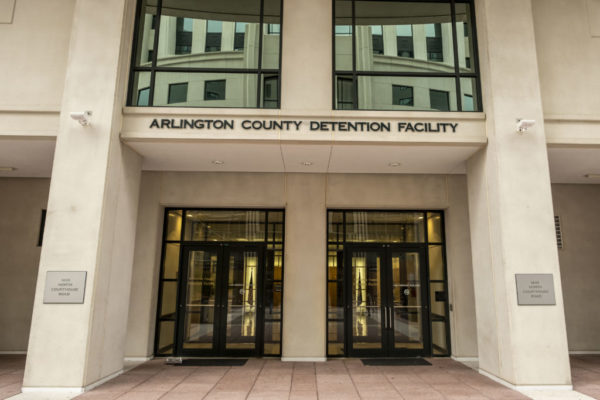
The pickleball craze could be headed to the local jail next.
Acting Sheriff Jose Quiroz, who is one of three vying for the support of local Democrats in the primary this coming Tuesday, said that one amenity he would like to add to the jail is a pickleball court.
In an interview by Arlington Independent Media (AIM), he said the court is “something different” — in addition to the existing basketball court and weight-lifting area in the jail — that deputies and inmates could use. He sees the additional court as a way to improve deputy wellness.
He also intends to add a relaxation room in the jail for deputies and to have wellness conversations with staff, facilitated by local nonprofit Center for Youth and Family Advocacy.
Those two measures are intended to stop the office from bleeding burned-out staff, a pattern in Arlington reflected nationally that sources say appears to be worsening within the Sheriff’s Office, with some deputies actively planning their departures. Already, the vacancy rate stands around 7%, up from a little greater than 3% in 2019, according to the 2024 approved budget.
“Our staffing all around is low,” Quiroz said in the interview. “We have a lot of vacancies.”
He is running against Arlington County police officer James Herring and retired sheriff deputy Wanda Younger. Early voting ends tomorrow (Saturday), while polls open for the Democratic primary on Tuesday. Quiroz’s opponents say they also have ideas for addressing what they say are morale and retention issues in the Arlington County Sheriff’s Office (ACSO).
Herring says the issue stems from deputies being forced to work overtime. They will leave Arlington for jurisdictions with better schedules.
If elected, he intends to advocate for better pay and benefits and, with input from deputies, create more balanced schedules that provide career growth opportunities and mentorship.
“If you can’t hire people faster than people leave your agency, it doesn’t matter how good your recruiting is,” Herring told ARLnow. “Losing a veteran deputy means more than just losing a filled position. It means that you’re losing their years of experience, their ability to mentor younger deputies, and their established connections with those in custody and in the community.”
(Herring’s AIM interview was just posted online this morning.)
He recently picked up endorsements from Abby Raphael, a former Arlington School Board member who also served as an assistant prosecutor, and former independent County Board member John Vihstadt. Both praised his plans for also improving inmate wellbeing.
Younger suggests ending the Sheriff’s unilateral ability to hire and fire deputies without cause. She also suggests relying more on auxiliary deputies — trained civilian volunteers, certified by the state, who sometimes have military or law enforcement experience.
“Hiring is definitely an issue. Retention is a main problem as well,” Younger said in her conversation with AIM. “In order to ensure they remain, we have to increase morale. That’s one area I would focus on.”
Quiroz has the endorsement of several other current and former local and state elected officials, as well as his predecessor, Beth Arthur, who stepped down in January and appointed Quiroz as acting sheriff.
ACSO has tried to tackle the staffing crunch by appointing a sergeant to assist with recruiting — which resulted in more applications processed and a slightly faster hiring window — and budgeting $20,000 in the 2024 budget for recruiting.
The sheriff’s office serves warrants, runs the county jail and provides security at the courthouse, in addition to some other local law and traffic enforcement responsibilities. One impact of the shortages has been fewer deputies providing security in courtrooms and more civilian court security supervisors filling in.
ACSO has a half-dozen part-time employees, according to the latest budget.
Quiroz said in his interview that his office makes it work with part-time staff and auxiliary deputies. (He noted previously that standards for auxiliaries were tightened before he took over because not all were law enforcement certified and “we had people who had weapons and didn’t have the appropriate training.”)
Despite the measures to fill staffing gaps, the deputy shortage has led to times when certain civil courts have not been staffed, to the chagrin of judges.
Another impact has been an uptick in the number of shifts when the jail is in lockdown, when inmates are confined to their cells because there are not enough deputies to monitor them if they want to go to the library or play basketball.
The number of shifts operating with staffing levels 31% below the required minimum during the day and 26% below minimum staffing levels at night rose from 479 in 2020 to an estimated 702 in 2023, according to the budget.
That has an impact on the mental health of inmates, says attorney Molly Newton. One client, who she described as “medically resistant” his entire life, called her last week, in tears, saying he decided to go on medication to cope with the lockdowns.
“Mental health [among inmates] is terrible because clients are constantly locked down due to staffing issues,” she said.
With low staffing, she says more of her calls to the jail to reach a client go unanswered — or she is asked to call back later, when she may be in court or otherwise unable to call.
One emerging reason for the uptick in lockdowns is an increase in emergency custody orders (ECOs) and temporary detention orders (TDOs). In these cases, law enforcement has to accompany people with serious mental illnesses to the emergency room or to a state psychiatric facility to be seen by a medical professional.
Rising numbers of ECOs and TDOs has strained law enforcement by making shifts last longer and reducing officers in the jail or out in the community, compounding burnout and departures.
“We are coping by modifying operations of the facility — canceling programs and visiting and lessening out-of-cell time — pulling staff from other divisions, and mandating overtime,” Chief Deputy Tara Johnson previously told ARLnow.

